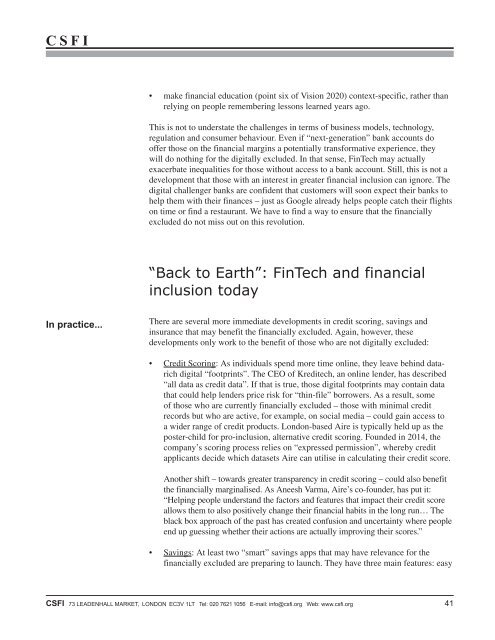CSFI
CSFI+-+Reaching+the+poor+-+release+version
CSFI+-+Reaching+the+poor+-+release+version
You also want an ePaper? Increase the reach of your titles
YUMPU automatically turns print PDFs into web optimized ePapers that Google loves.
<strong>CSFI</strong><br />
• make financial education (point six of Vision 2020) context-specific, rather than<br />
relying on people remembering lessons learned years ago.<br />
This is not to understate the challenges in terms of business models, technology,<br />
regulation and consumer behaviour. Even if “next-generation” bank accounts do<br />
offer those on the financial margins a potentially transformative experience, they<br />
will do nothing for the digitally excluded. In that sense, FinTech may actually<br />
exacerbate inequalities for those without access to a bank account. Still, this is not a<br />
development that those with an interest in greater financial inclusion can ignore. The<br />
digital challenger banks are confident that customers will soon expect their banks to<br />
help them with their finances – just as Google already helps people catch their flights<br />
on time or find a restaurant. We have to find a way to ensure that the financially<br />
excluded do not miss out on this revolution.<br />
“Back to Earth”: FinTech and financial<br />
inclusion today<br />
In practice...<br />
There are several more immediate developments in credit scoring, savings and<br />
insurance that may benefit the financially excluded. Again, however, these<br />
developments only work to the benefit of those who are not digitally excluded:<br />
• Credit Scoring: As individuals spend more time online, they leave behind datarich<br />
digital “footprints”. The CEO of Kreditech, an online lender, has described<br />
“all data as credit data”. If that is true, those digital footprints may contain data<br />
that could help lenders price risk for “thin-file” borrowers. As a result, some<br />
of those who are currently financially excluded – those with minimal credit<br />
records but who are active, for example, on social media – could gain access to<br />
a wider range of credit products. London-based Aire is typically held up as the<br />
poster-child for pro-inclusion, alternative credit scoring. Founded in 2014, the<br />
company’s scoring process relies on “expressed permission”, whereby credit<br />
applicants decide which datasets Aire can utilise in calculating their credit score.<br />
Another shift – towards greater transparency in credit scoring – could also benefit<br />
the financially marginalised. As Aneesh Varma, Aire’s co-founder, has put it:<br />
“Helping people understand the factors and features that impact their credit score<br />
allows them to also positively change their financial habits in the long run… The<br />
black box approach of the past has created confusion and uncertainty where people<br />
end up guessing whether their actions are actually improving their scores.”<br />
• Savings: At least two “smart” savings apps that may have relevance for the<br />
financially excluded are preparing to launch. They have three main features: easy<br />
<strong>CSFI</strong> 73 LEADENHALL MARKET, LONDON EC3V 1LT Tel: 020 7621 1056 E-mail: info@csfi.org Web: www.csfi.org 41


